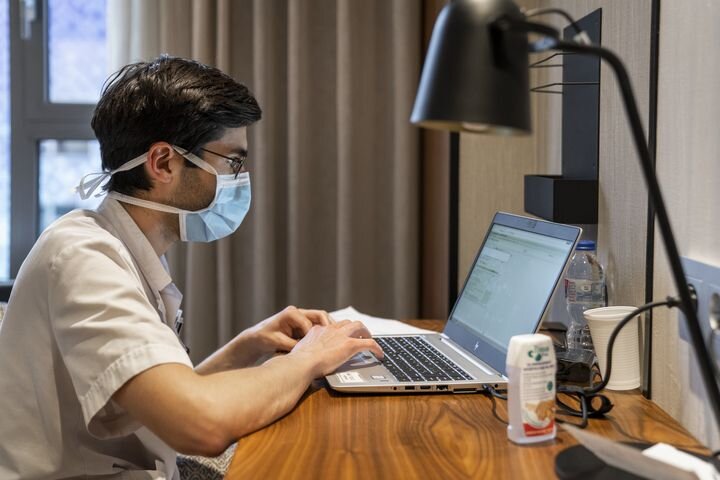Since the imposition of quarantine, there has been a boom in the accreditation of online certifications and other alternative credentials.
The end of March was when the quarantine due to COVID-19 officially began in Mexico and other countries. While some people could the same work or school schedule that they had from the comfort of their home, others lost their jobs or had the misfortune of being new graduates in the middle of the pandemic. For the recent graduates currently searching for a job opportunity, as for everyone else, the time has seemed to lengthen during the quarantine.
Before the pandemic, it seemed that time was slipping from our hands; in the wake of the quarantine, time began to yield more. The commuting time, activities, and social events stopped consuming minutes, hours, and, at some point, even days if counted together. The uncertainty of what would happen paralyzed many people, but this same uncertainty encouraged others to start training themselves even more or exploring a new hobby, thanks to the enormous quantity of resources that were released for free online.
People began enrolling in various courses in Khan Academy, Coursera, Udemy, edX, LinkedIn Learning, or Crehana, to name a few, to improve their professional profiles, bring themselves current on topics of various kinds, or simply to kill some time. You can learn to write song lyrics with professionals from Berklee College of Music; become familiar with European geopolitics in Science Po; learn to negotiate at the University of Michigan; learn a new language with edX, or how to use the bundle of Adobe products with the variety of courses that Crehana offers. Or even complete a specialized online program on instructional design, active learning, and digital pedagogy offered by Tec de Monterrey.
The variety of resources is infinite. If certification is desired, the enrollee must pay a fee for the certificate. However, this expense is not as considerable as taking a face-to-face course, especially considering that excellent instructors from the best universities and educational institutions in the world teach many of the online classes available on these platforms.
The Massive and Open Online Courses (MOOCs) transcend the limits imposed by distances and, to some extent, costs. In addition to accredited classes, students can pursue degrees, specializations, and even master’s degrees online. The flexibility of the MOOCs, in turn, overcomes time barriers because these courses can be taken at any time at a personal pace; each individual invests the attention that he or she can. In most cases, the users can begin the day when they so desire.
Although these courses have been in the online-education market for more than 12 years, their value today is called into question because they represent a paradigm shift. The face-to-face teaching modality is starting to mix with the virtual, and many people cannot adapt to this change. However, these new modalities will continue to increase. This market segment has been predicted to be worth $243 billion in 2022, according to data from Statista.
Coursera registered ten million new users from mid-March to mid-May.
While skepticism still surrounds the value of MOOCs, the fact is that certified resources add significant value to the curriculum vitae, especially if they are shared on LinkedIn, the largest network of professionals, because they help provide a more active, robust profile. Besides the knowledge and skills that they help develop, the courses on these platforms also bring a more self-taught image to an applicant’s resume, a quality highly valued by employers.
Alma Mondragón, a talent attraction analyst at L’Oréal Hispano-American Zone, affirms that the company pays attention to those candidates who take advantage of these tools: “We recognize the value of having taken online education, ranging from graduates to bachelor’s degrees or master’s degrees.” Employers are looking for self-taught and consistent professionals, and this is easily demonstrated by completing a course and obtaining a certificate. However, they also want skills and well-learned knowledge.
Among the most in-demand skills in the world, according to LinkedIn, are blockchain management, analytical reasoning, user experience design (UX), business analysis, marketing, sales, scientific computing, video production, emotional intelligence, and creativity, to name a few.
Since the imposition of quarantine, there has been a boom in the accreditation of these certification resources. Coursera managed to attract ten million new users from mid-March to mid-May. Many of my colleagues have managed to complete various courses in record time and show it on their LinkedIn profiles. However, the speed with which the certifications are gained calls into question the knowledge acquired when attaining them. The certificate seems to be the end and not the means to become a better prepared professional. Therefore, it is urged to see certifications as a means of learning, not just something to run through, and also, they are a way to continue preparing oneself.
MOOCs are also an excellent option to initiate or continue with a hobby, make a space for yourself, and get into it. MasterClass, Crehana, and Domestika are three of the platforms that offer these types of courses. So, not everything has to be related to business or work productivity. It is also of paramount importance to take care of mental health, allowing moments of leisure.
The quarantine brought with it extra time; one has to take advantage of this. MOOCs can help, either with courses to improve the professional profile, encourage the start of a new hobby, or continue with a beloved activity set aside for lack of time. Remember, it is never too late to learn something new.
Translation by Daniel Wetta.
This article from Observatory of the Institute for the Future of Education may be shared under the terms of the license CC BY-NC-SA 4.0 
)
)

)